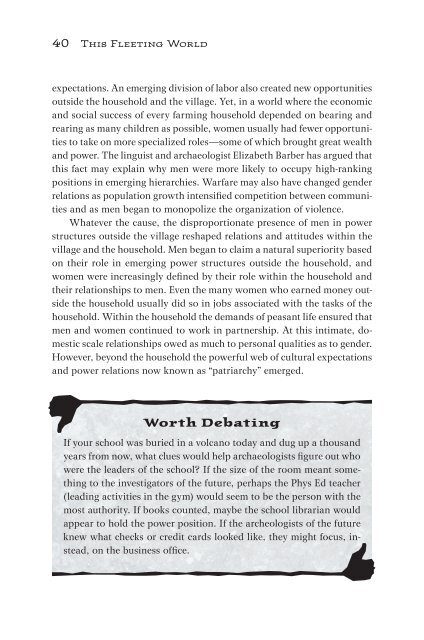This Fleeting World
This Fleeting World
This Fleeting World
Create successful ePaper yourself
Turn your PDF publications into a flip-book with our unique Google optimized e-Paper software.
40 <strong>This</strong> <strong>Fleeting</strong> <strong>World</strong><br />
expectations. An emerging division of labor also created new opportunities<br />
outside the household and the village. Yet, in a world where the economic<br />
and social success of every farming household depended on bearing and<br />
rearing as many children as possible, women usually had fewer opportunities<br />
to take on more specialized roles—some of which brought great wealth<br />
and power. The linguist and archaeologist Elizabeth Barber has argued that<br />
this fact may explain why men were more likely to occupy high-ranking<br />
positions in emerging hierarchies. Warfare may also have changed gender<br />
relations as population growth intensified competition between communities<br />
and as men began to monopolize the organization of violence.<br />
Whatever the cause, the disproportionate presence of men in power<br />
structures outside the village reshaped relations and attitudes within the<br />
village and the household. Men began to claim a natural superiority based<br />
on their role in emerging power structures outside the household, and<br />
women were increasingly defined by their role within the household and<br />
their relationships to men. Even the many women who earned money outside<br />
the household usually did so in jobs associated with the tasks of the<br />
household. Within the household the demands of peasant life ensured that<br />
men and women continued to work in partnership. At this intimate, domestic<br />
scale relationships owed as much to personal qualities as to gender.<br />
However, beyond the household the powerful web of cultural expectations<br />
and power relations now known as “patriarchy” emerged.<br />
Worth Debating<br />
If your school was buried in a volcano today and dug up a thousand<br />
years from now, what clues would help archaeologists figure out who<br />
were the leaders of the school? If the size of the room meant something<br />
to the investigators of the future, perhaps the Phys Ed teacher<br />
(leading activities in the gym) would seem to be the person with the<br />
most authority. If books counted, maybe the school librarian would<br />
appear to hold the power position. If the archeologists of the future<br />
knew what checks or credit cards looked like, they might focus, instead,<br />
on the business office.


